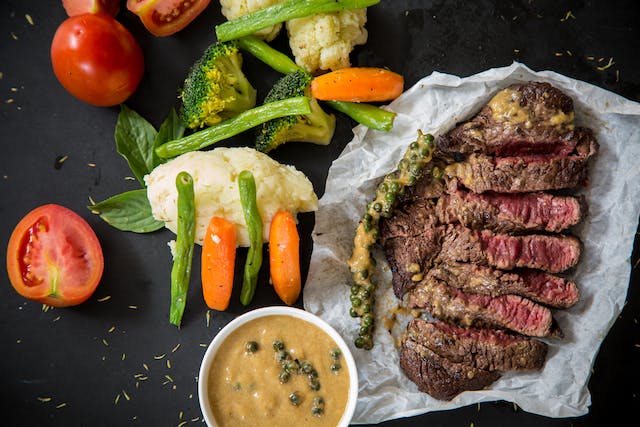Which weight-loss diet is the best?

When it comes to shedding those extra pounds, the internet bombards us with an overwhelming array of weight-loss diets, each claiming to be the ultimate solution. From the trendy keto diet to the plant-based wonders of veganism, how do you navigate this dietary maze to find what truly works for you? Let’s delve into the intricacies of different weight-loss diets and decipher which one might be the best fit for your journey.
Table of Contents
Introduction
Embarking on a weight loss journey is akin to stepping into a complex labyrinth where the wrong turn might lead you astray. Understanding the nuances of popular diets is crucial for making an informed decision. Let’s break down the pros and cons, the science, and the human stories behind the myriad weight-loss diets available.
Understanding Different Weight Loss Diets
Popular weight-loss Diets
Keto Diet

The ketogenic diet, renowned for its carb-restrictive approach, has surged in popularity as a promising weight-loss strategy. But the burning question remains: does it truly live up to the hype, and can it be sustained in the long run?
Unraveling the Mysteries of the Keto Phenomenon
The keto diet, characterized by a low-carbohydrate, high-fat intake, aims to shift the body into a state of ketosis. This metabolic state prompts the body to burn fat for energy instead of relying on carbohydrates. Advocates praise its potential for rapid weight loss and improved mental clarity.
Weighing the Pros and Cons
While the keto diet has shown promising results for some, it comes with its share of challenges. The initial adjustment, known as the “keto flu,” can be daunting, and the strict carb restrictions may pose practical difficulties for many. Moreover, concerns linger about the diet’s long-term impact on heart health and nutrient intake.
Is keto sustainable for you?
The sustainability of the keto diet largely depends on individual preferences, lifestyle, and health considerations. Before diving into this dietary trend, it’s crucial to weigh the potential benefits against the challenges and determine if it aligns with your long-term health and wellness goals.
Ready to delve deeper into the world of keto? Learn more about the science behind ketosis, discover practical tips for success, and explore real-life stories from individuals who have embraced the keto lifestyle.
Learn more about the Keto Diet
Paleo Diet
Many individuals turn to various diets to align their eating habits with our evolutionary roots. One such dietary approach gaining popularity is the Paleolithic, or Paleo diet. In this comprehensive guide, we delve into the essence of the Paleo diet, exploring its historical context, its alignment with human genetics, and its potential impact on health.
Unearthing the Paleolithic Era
The Paleo diet draws inspiration from the Paleolithic Era, a period spanning roughly 2.5 million to 10,000 years ago. This epoch marked a time when our ancestors thrived by hunting and gathering, consuming foods directly sourced from nature. The diet seeks to emulate the nutritional patterns of this era, excluding foods that became prevalent with the advent of farming approximately 10,000 years ago.
The Core Components of a Paleo Diet
A contemporary Paleo diet revolves around a rich array of whole foods, reminiscent of what our ancestors could obtain through hunting and gathering. The approved list includes:
What to Eat
- Fruits
- Vegetables
- Nuts and seeds
- Eggs
- Lean meats, especially grass-fed animals or wild game
- Fish, particularly those rich in omega-3 fatty acids (e.g., salmon, mackerel, albacore tuna)
- Oils from fruits and nuts (e.g., olive oil, walnut oil)
What to Avoid
- Grains (e.g., wheat, oats, barley)
- Legumes (e.g., beans, lentils, peanuts)
- Dairy products (e.g., milk, cheese)
- Refined and added sugar
- Added salt
- Starchy vegetables (e.g., corn, jicama, peas, white potatoes)
- Highly processed foods (e.g., chips, cookies)
The Purpose: Aligning with Evolutionary Genetics
The fundamental purpose of adopting a Paleo diet is rooted in the belief that our genes have not adequately adapted to the dietary shifts that accompanied the advent of agriculture. Farming brought forth foods like grains, legumes, and dairy, altering the nutritional landscape and, according to Paleo proponents, contributing to modern health issues such as obesity, diabetes, and heart disease.
Benefits and Results: Separating Fact from Fiction
While the Paleo diet exhibits features of recommended healthy diets, scientific studies on its long-term effects are limited and often inconclusive. Short-term studies suggest potential benefits in areas such as weight loss, blood pressure management, and improved lipid profiles. However, the lack of extensive, randomized, and long-term trials makes it challenging to draw definitive conclusions.
Addressing Skepticism and Nutritional Concerns
Sceptics raise valid points about the Paleo diet, emphasizing the exclusion of whole grains, legumes, and dairy—nutrient-rich foods. Concerns about nutritional adequacy, affordability, and the lack of long-term clinical studies necessitate a cautious approach. Comparisons with well-established diets, such as the Mediterranean diet, underline the importance of a balanced and varied approach to nutrition.
Evolving Perspectives: Beyond the Stone Age
Critics argue for a nuanced understanding of dietary evolution, considering factors beyond farming. Archaeological findings reveal early human diets were diverse and shaped by geography, climate, and food availability. Genetic research highlights ongoing evolutionary changes, challenging the simplistic narrative that the Paleolithic era dictates our optimal dietary choices.
Vegan Diet
A vegan diet is a plant-based dietary approach that abstains from the consumption of animal products and by-products. Unlike some other plant-based diets, such as vegetarianism, which may include dairy products and eggs, a vegan diet strictly excludes all forms of animal-derived ingredients. The primary focus is on consuming a wide variety of plant foods to meet nutritional needs.
Key Components of a Vegan Diet:
- Fruits and Vegetables: Rich in vitamins, minerals, and antioxidants, fruits and vegetables form the foundation of a vegan diet, providing essential nutrients for overall health.
- Whole Grains: Foods like brown rice, quinoa, oats, and whole wheat contribute complex carbohydrates, fibre, and various nutrients.
- Legumes: Beans, lentils, and chickpeas are excellent sources of protein, fibre, and other essential nutrients for vegans.
- Nuts and seeds: These are important for healthy fats, protein, and micronutrients. Examples include almonds, walnuts, chia seeds, and flaxseeds.
- Plant-based Protein Sources: Tofu, tempeh, and seitan are popular protein-rich options for vegans.
- Plant-based Oils: Oils derived from plants, such as olive oil and avocado oil, can be used for cooking and dressing.
- Fortified Foods: Vegans often consume fortified foods or supplements for nutrients that are more abundant in animal products, such as vitamin B12, vitamin D, and omega-3 fatty acids.
Foods Excluded from a Vegan Diet:
- Meat and Poultry: All types of meat, including red meat, poultry, and game, are excluded.
- Fish and Seafood: Fish and other seafood are not part of a vegan diet.
- Dairy Products: Milk, cheese, yoghurt, and other dairy items are avoided.
- Eggs: All forms of eggs, whether chicken or other animal eggs, are not consumed.
- Honey: Some vegans choose to exclude honey due to ethical concerns related to beekeeping practices.
Veganism Beyond Diet:
While a vegan diet primarily focuses on food choices, many individuals adopt veganism as a lifestyle encompassing ethical, environmental, and health considerations. This includes avoiding other animal-derived products such as leather and wool and supporting cruelty-free and sustainable practices.
Benefits of a Vegan Diet:
- Health: A well-planned vegan diet can provide a range of health benefits, including lower risks of heart disease, hypertension, and certain cancers.
- Environmental Impact: Choosing plant-based foods over animal products can have a lower environmental footprint, reducing greenhouse gas emissions and land use.
- Ethical Considerations: Many adopt a vegan lifestyle due to ethical concerns about animal welfare and the treatment of animals in the food industry.
- Weight Management: A vegan diet, when balanced, may contribute to weight management and overall well-being.
Individuals on a vegan diet need to pay attention to proper nutrition, ensuring an adequate intake of essential nutrients that may be less abundant in plant-based foods.
Consulting with a healthcare professional or a registered dietitian can be beneficial to creating a well-rounded and nutritionally sound vegan meal plan.
Mediterranean Diet
The Mediterranean diet is a dietary pattern inspired by the traditional eating habits of people living in the Mediterranean region, particularly in countries like Greece, Italy, and Spain.
It is renowned for its potential health benefits and has gained recognition as one of the healthiest diets globally. The Mediterranean diet emphasizes whole, minimally processed foods and a balanced lifestyle. Here are the key components of the Mediterranean diet:
Core Components of the Mediterranean Diet:

- Abundance of Plant Foods:
- Fruits and Vegetables: A wide variety of colourful fruits and vegetables provide essential vitamins, minerals, and antioxidants.
- Whole Grains: Foods like whole wheat, barley, brown rice, and quinoa contribute fiber and complex carbohydrates.
- Healthy Fats:
- Olive Oil: The primary source of fat is olive oil, which is rich in monounsaturated fats and has been associated with heart health.
- Protein Sources:
- Fish and seafood: Regular consumption of fish, particularly fatty fish like salmon and mackerel, provides omega-3 fatty acids.
- Legumes: Beans, lentils, and chickpeas are staples, offering protein, fiber, and various nutrients.
- Nuts and Seeds: Almonds, walnuts, and flaxseeds are sources of healthy fats, protein, and other essential nutrients.
- Poultry: Moderate consumption of poultry, such as chicken and turkey, is common.
- Dairy: Moderate amounts of dairy products, especially yogurt and cheese, are included.
- Moderate Consumption of Red Wine:
- Red Wine: In moderation, red wine is often enjoyed with meals and is believed to have health benefits due to its antioxidant content.
- Herbs and Spices:
- Herbs and Spices: Fresh herbs like basil, rosemary, and oregano, along with garlic and onions, are used to flavor dishes instead of excessive salt.
- Limited Red Meat and Sweets:
- Red Meat: Red meat is consumed in moderation, with an emphasis on lean cuts.
- Sweets: Desserts and sweets are limited, and when consumed, they are often made with natural sweeteners.
Lifestyle Factors:

- Physical Activity:
- Regular Exercise: The Mediterranean lifestyle encourages regular physical activity, such as walking and other forms of exercise.
- Social Connections:
- Social Meals: Meals are often shared with family and friends, promoting a sense of community and well-being.
Health Benefits of the Mediterranean Diet:
- Heart Health: The diet is associated with a reduced risk of heart disease, thanks to its emphasis on healthy fats and overall nutrient-rich foods.
- Weight Management: The Mediterranean diet is linked to weight management and a lower risk of obesity.
- Reduced Inflammation: The abundance of anti-inflammatory foods may contribute to reduced inflammation in the body.
- Improved Cognitive Function: Some studies suggest that the Mediterranean diet may support cognitive health and reduce the risk of neurodegenerative diseases.
- Diabetes Management: It may help in managing and preventing type 2 diabetes.
Comparing Diet Philosophies
The Science Behind Diets
Macronutrient Composition
Delve into the role of macronutrients in different diets and how they impact your body’s ability to burn fat.
Impact on Metabolism
Unravel the mysteries of how various diets influence your metabolism and energy expenditure.
Effectiveness and Sustainability
Short-Term vs. Long-Term Results
Rapid Weight Loss vs. Steady Progress
Embarking on a journey to shed excess weight is a personal decision that involves considering various approaches. Two common strategies are rapid weight loss and steady progress. Each approach has its merits and considerations, impacting both physical and mental well-being.
Rapid Weight Loss: The Swift Route
Pros:
- Quick Results: Rapid weight loss often yields noticeable results in a shorter time frame, providing immediate motivation.
- Initial Boost: The initial drop in weight can boost confidence and motivation to continue the journey.
- Structured Programs: Some people find success in structured, short-term programs that offer rapid results.
Cons:
- Muscle Loss: Rapid weight loss may lead to a loss of muscle mass, affecting overall body composition.
- Nutrient Deficiency: Crash diets may lack essential nutrients, potentially causing deficiencies.
- Metabolic Impact: Drastic calorie restriction can slow down metabolism, making weight maintenance challenging.
Steady Progress: The Sustainable Approach
Pros:
- Sustainable Lifestyle Changes: Steady progress often involves adopting sustainable habits, promoting long-term success.
- Preservation of Muscle Mass: A gradual approach helps preserve lean muscle mass, contributing to a healthier body composition.
- Established Habits: Slow and steady progress allows for the development of lasting habits that support overall well-being.
Cons:
- Patience required: Results may take longer to become noticeable, requiring patience and persistence.
- Potential Plateaus: Weight loss may plateau at times, requiring adjustments to the approach.
- Motivational Challenges: Some individuals may find it challenging to stay motivated during a more extended weight loss journey
Simple table illustration
| Aspect | Rapid Weight Loss | Steady Progress |
|---|---|---|
| Pros | – Quick Results | – Sustainable Lifestyle Changes |
| – Initial Boost | – Preservation of Muscle Mass | |
| – Structured Programs | – Established Habits | |
| Cons | – Muscle Loss | – Patience Required |
| – Nutrient Deficiency | – Potential Plateaus | |
| – Metabolic Impact | – Motivational Challenges | |
| Considerations | – Short-Term Goals | – Long-Term Health |
| – Individual Factors | – Individual Factors | |
| Professional Guidance | – Consult a Professional | – Consult a Professional |
Ultimately, whether to pursue rapid weight loss or steady progress depends on individual preferences, goals, and health considerations. Striking a balance between achieving results and maintaining overall well-being is key.
Regardless of the chosen approach, it’s crucial to prioritize sustainable habits and focus on overall health rather than just the number on the scale.
Weight loss is a journey, and the most successful paths are those that lead to lasting, positive changes in lifestyle and mindset.
Choosing the Right Approach:
Consider Your Goals:
- Short-Term Goals: If you have specific short-term goals, such as an event or deadline, rapid weight loss might be considered.
- Long-Term Health: For long-term health and sustainable habits, a steady progress approach is often recommended.
Individual Factors:
- Metabolic Health: Consider your metabolic health and how your body responds to different approaches.
- Lifestyle: Assess your lifestyle and how well a chosen approach fits into your daily routine.
Professional Guidance:
- Consult a Professional: Before embarking on any weight loss journey, it’s advisable to consult with a healthcare professional or a registered dietitian for personalized advice.
Lifestyle Adaptability
How well does a diet fit into your everyday life? Consider the long-term implications of lifestyle changes associated with different weight-loss plans.
Considering Personal Preferences and Restrictions
Catering to Dietary Needs
Allergies and Sensitivities
Navigate the challenges of weight loss when dealing with allergies and sensitivities to certain foods.
Cultural and Ethical Considerations
How do cultural and ethical beliefs shape our dietary choices? Explore the impact of personal values on the weight-loss journey.
Expert Opinions and Studies
Insights from Nutritionists
Research Findings
What does the scientific community say about the effectiveness of popular diets? Examine the latest research findings.
Pros and Cons
Balance is key. Discover the advantages and potential drawbacks of different diets as outlined by nutrition experts.
Real People, Real Stories
“I was skeptical about rapid weight loss, but after reading about it in the informative post, I decided to give it a try. The quick results were truly motivating, and I lost 15 pounds in just a month! The structured approach provided a clear roadmap, and I could see the difference in the mirror. Thanks to the post’s insights, I not only achieved my short-term goal for an upcoming event but also kickstarted a healthier lifestyle.”

Sarah’s
Transformation

Great experience
“Steady progress has been my mantra ever since I read about it in the post. Patience was my challenge, but the emphasis on sustainable habits made all the difference. Over several months, I lost 25 pounds, and the best part is, I’ve maintained it. The post helped me understand the importance of preserving muscle mass and focusing on overall health. I’m grateful for the guidance that transformed my weight loss journey into a lifestyle transformation.”
~ Emily’s.
Success Stories on Different Diets
Transformative Experiences
Explore the inspiring tales of individuals who have successfully navigated the challenges of weight loss through various diets.
Challenges and Learnings
Not every journey is smooth. Learn from the challenges faced by real people and how they overcame them on their path to weight loss.
The Psychology of Dieting
Mental and Emotional Impact
Relationship with Food
Examine the psychological aspects of dieting, including the emotional relationship we have with food.
Motivation and Discipline
What role does motivation play, and how can one cultivate the discipline needed for a successful weight loss journey?
Customizing Your Weight Loss Journey
Tailoring Diets to Individual Needs
Consultation with Health Professionals
The importance of seeking guidance from healthcare experts in tailoring a diet to meet individual needs.
Trial and Error
Why is the trial-and-error approach essential in finding the perfect diet that aligns with your body and goals?
Busting Diet Myths
Common Misconceptions
Spot Reduction
Is it possible to focus on losing fat in particular areas? Unravel the truth behind the myth of spot reduction.
One-Size-Fits-All Approaches
Are there truly universal diet plans that work for everyone? Explore the pitfalls of adopting one-size-fits-all approaches.
Practical Tips for Choosing the Right Diet
Assessing Lifestyle and Goals
Realistic Expectations
Set achievable goals and understand the importance of realistic expectations in your weight loss journey.
Gradual Changes
Why is a gradual transition into a new diet more likely to lead to long-term success than a sudden, drastic change?
Balancing Diet with Exercise
Importance of Physical Activity
Finding the Right Exercise Routine
How does incorporating exercise complement your chosen diet, and how can you find the right workout routine for your body?
Synergy with Diet
Explore the symbiotic relationship between a well-balanced diet and a tailored exercise regimen for optimal weight loss.
Staying Informed in the World of Nutrition
Adapting to New Research
Updated Guidelines
Stay abreast of the ever-evolving field of nutrition by understanding the latest guidelines and research.
Reevaluating Choices
Why it’s crucial to reassess your dietary choices in light of new information and personal experiences.
Common Pitfalls to Avoid
Fad Diets and Extreme Measures
Understanding Red Flags
Identify the warning signs of fad diets and extreme measures that may jeopardize your long-term health.
Long-Term Health Considerations
Consider the broader impact of your chosen diet on your overall health in the long run.
Conclusion
In the labyrinth of weight-loss diets, there’s no one-size-fits-all solution. Your journey is unique, and the best diet is one that aligns with your preferences, goals, and lifestyle. Understanding the science, considering personal factors, and staying informed will empower you to make the right choice for lasting results.
Ready to embark on your personalized weight loss journey? Take the first step towards a healthier you. Explore the methods discussed in this article, consult with professionals if needed, and make informed decisions.
Remember, your path to weight loss is as unique as you are. Read more about the diverse world of weight-loss diets and start your journey to a healthier lifestyle today!



